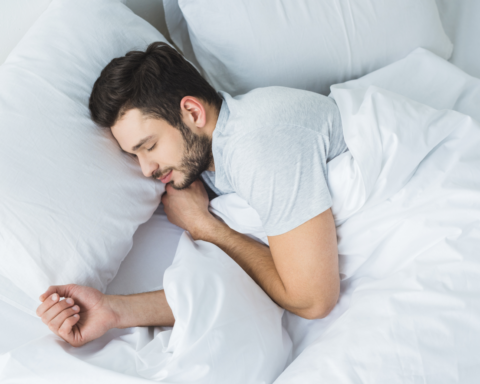Melatonin, also called sleep hormone, regulates the body’s circadian rhythm, supports eye health, alleviates stomach ulcers and heartburn, and improves human growth hormone. You can supplement with melatonin as it is safe.
Almost one-third of the world’s population is affected by poor sleep, with many admitting that they sleep less than six hours every night. Though many people take it lightly, poor sleep can be a recipe for dire health consequences. Many people experience lower energy levels contributed by a lack of sleep, while others report lower productivity, high blood pressure, and increased risk of diabetes. The hormone melatonin is responsible for sending people to sleep, and today it exists in the form of supplements for those experiencing difficulty sleeping. We will peer into how this supplement works, dosage, and safety precautions.
What is melatonin?
The body naturally makes several useful hormones, and one such hormone is melatonin. The brain’s pineal glands secrete this hormone, though it is also secreted from other organs such as bone marrow, eyes, and the gut. Melatonin, also called sleep hormone, can promote faster sleep at high levels. People with insomnia often use melatonin supplements to help sway them to sleep. Melatonin could also help treat stomach ulcers, support eye health, ease tinnitus symptoms, and improve men’s growth hormones.
How Melatonin Works
Melatonin synchronizes with the body’s circadian rhythm, the internal clock in our bodies that tells us when to sleep, wake, or eat. Additionally, it helps balance your body temperature, blood pressure, and certain body hormones. Apart from promoting the feeling of sleep, it also connects to body receptors, thus relaxing your body.
Melatonin counteracts the production of dopamine hormone that could keep you awake and controls the day-night cycle in your eyes to help you fall asleep. Studies show that melatonin is highly produced at night and that light inhibits its production, signifying to your body that it’s time to wake up.
Several factors can also hamper melatonin secretion at night, including smoking, stress, exposure to light, shift work, and aging. Melatonin supplements have been employed to help boost low levels and stabilize the body’s internal clock.
Melatonin and Sleep
Studies have shown that taking melatonin before going to sleep can improve your sleep quality. For instance, one review of 19 studies on individuals with sleep disorders ascertained that taking melatonin minimizes the time taken to fall asleep by seven minutes. Some studies also suggest that melatonin can help combat jet lag, a sleep disorder that happens when the body’s internal clock has not synced with the time zone, especially for shift workers—melatonin help in syncing the internal clock with the time change.
Other Health Benefits of Melatonin
Apart from enhancing sleep, melatonin has other notable health benefits too.
It could support eye health.
Studies indicate that melatonin is a powerful antioxidant that could help reduce the chances of eye disease. One study done by scientists on 100 individuals with age-related macular degeneration (AMD) gave the participants three mg of melatonin every day for 6-24 months. The result showed that melatonin delayed eye damage associated with AMD and protected the retina with no major side effects.
It could alleviate heartburn and stomach ulcers.
Since melatonin has antioxidant properties, it could help in treating heartburn and stomach ulcers. One study involving 21 people found that taking tryptophan and melatonin coupled with omeprazole relieves stomach ulcers due to bacteria H. pylori. Another study examined 36 individuals having GERD and taking either melatonin supplement, omeprazole, or both. The result showed that melatonin reduced heartburn symptoms with increased efficiency when used together with omeprazole.
Melatonin could reduce Tinnitus Symptoms.
Tinnitus, a constant annoying sound in the ears, is a condition that can prevent one from falling asleep. Researchers recommend melatonin to individuals with tinnitus to reduce its symptoms and soothe one to sleep. One study done on adults with this condition and were given 3 mg of melatonin for a month showed that the participants had reduced symptoms and improved quality of sleep.
It enhances Men’s growth hormones.
The body releases human growth hormone when sleeping, and several studies suggest that taking melatonin supplements by young men could increase HGH levels. Melatonin also sensitizes the pituitary gland that releases HGH. Another study also showed that combining melatonin and resistance training increases HGH levels in men.
How to Supplement with Melatonin
It is recommended you begin with small doses for beginners, though it would be best to talk to your healthcare professional before buying over-the-counter melatonin for your consumption. For example, you could begin taking 0.5 mg or 1 mg half an hour before heading to bed. If the dose is not strong to send you to sleep, you could upscale the dose to 3 or 5 mg.
Safety and Side Effects of Melatonin Supplements
Existing evidence from several experiments shows that melatonin is safe, non-addictive, and nontoxic. However, some individuals have experienced mild side effects, including headaches, dizziness, and nausea. Melatonin can also interact with some medications, such as blood thinners, sleep aids, antidepressants, blood pressure medications, diabetes medications, oral contraceptives, and immunosuppressants. If you are under the above medication, it is good to consult with your physician before including melatonin in your regimen.
Melatonin and Alcohol
Alcohol can hamper melatonin production. One study involving 29 adults suggested that taking alcohol one hour before bedtime could hinder melatonin production by 19%. People with Alcohol use disorder (AUD) have been found to have low melatonin levels. However, taking melatonin supplements in these cases does not guarantee success.
Melatonin and Pregnancy
Melatonin is an important hormone during pregnancy; however, its levels are not often stable during pregnancy. The body produces low melatonin during the first six months of pregnancy; nevertheless, the hormone will rise as the women near their due date. The mother’s melatonin is transferred to the fetus during pregnancy to help develop its circadian rhythm, endocrine, and nervous systems. The fetus also benefits from the mother’s melatonin in protecting its nervous system from the potential damage from oxidative stress. However, there are no conclusive studies on the benefits of melatonin on pregnant women; thus, it is not recommended for expectant mothers.
Melatonin and Older adults
As one age, the body’s ability to produce melatonin reduces significantly, leading to poor sleeping patterns in older adults. These individuals can benefit from melatonin supplements to enhance their sleep duration and sleep onset. Some studies also suggest that melatonin can help with Alzheimer’s disease and mild cognitive impairment (MCI).
The Bottom Line
Melatonin supplements are popular with individuals with sleep disorders like insomnia. This supplement can help one fall asleep, thus improving sleep quality in old and young people alike. Melatonin can also help with improving growth hormone in men and alleviate stomach ulcers and heartburn when combined with suitable medication. However, it can react with some medication, hence the need to consult with your doctor before incorporating them into your regimen if you are under medications.
- Learn to Enjoy Self-care Routine - September 21, 2023
- Jonathan Aufray’s Story - July 29, 2023
- From Public Housing To Ivy League: The Inspiring Journey of Crystaltharrell.com and its Founder - June 7, 2023









